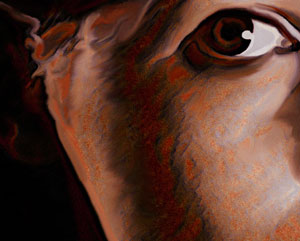Eros is responsible for much destruction in this world, yes? Why?
Probably because, like all the gods, Eros is Janus-faced, and the sinister backside of the head is at least as strong, prevalent, and active in the world as the benevolent front side. Eros for me is a very broad, powerful love – much larger than erotic, romantic, filial love, larger than love that immerses you in a vocation, larger even than compassion. Eros is the god of all these loves combined and more. To Look on (and succumb to) the perverted (complimentary) backside of the head can, therefore, be pretty terrible. The protagonist in my story is perverse and sinister. I find him frightening. I am also thoroughly fascinated by him. I want to sort through the details and understand the way they have fallen in place to produce the “monster” embodiment of the God of Love—Nazi automaton, Agent (Angel) of Destruction, The One who Scrapes Off the things that make use human—even if they are indiscretions, outer layers or projections. Eros in my story, I think, indulges in a string of awful behaviors (obsessions), culminating in the use of coercion to bring himself romantic love, manipulation of the other for his own ardent purposes, and projection of his own deified persona, (a paltry deity really), over his customers (supplicants) as the ultimate godhead.
Oh, and also, another fascinating and awe full incarnation that formed itself as I wrote, rewrote, read and reread this story was Eros as the archetype of the artist—which may or may not incite me to honest self examination.
What do poetry and flash fiction share? Where do they part ways?
The effect on my physiognomy, my psychology and whatever else comprises the sum of my parts is exactly the same—whether it is poetry or flash fiction. I become immersed, I really do loose myself, I am driven, obsessed, I am enthralled totally by the work as it engages me, I am in love.
The big difference for me is probably that the poem sings a little more, perhaps it is a little more lyrical. The distinction, though, breaks down easily—I feel very uncomfortable making it. My poetry has rhythms and line breaks that are probably more musical—has deeper and more obvious cadence and his more pronounce rhythmic extremes. I started mostly with poetry, and my first published works were poems. I attended a workshop once with Marvin Bell. We were pouring over poems, when a janitor rolled a dumpster by in the hall. Marvin Bell looked up with a glint in his eye and said, “There goes prose.” This was funny, I laughed with everyone else, but obviously not true.
If a black monolith did appear in our world—and we touched it—what do you think it should teach us?
Either, it would teach us anything and everything we wanted to know, or it would suck the knowledge, the life, the soul right out of us.
Erasure, for me, is at the heart of this story. Talk to me about it.
Again, I think there is a lot of ambiguity—ambiguity perhaps as a symptom of an immense interwoven web of reality. Even though Eros seems the only presence-in-body, Thanatos lurks somewhere around, in, behind, beyond this story. Perhaps the protagonist is split. Being erased is something I myself fight against. I do not willingly concede my individual awareness. And yet, I do, immerse my self in the writing and, despite the fact that my faculties (and facilities) are acutely present, I do feel I am lost.
Eros is an eraser. I think he has erased his own humanity (and deity) and is now starting on other humans. He seduces the most vulnerable I think (though not exclusively)—those that are already well on their way to surrendering their own human-ness and, also, those that perhaps don’t understand because they don’t have some kind of inside knowledge.
Erasing someone else – I can’t think of anything worse, any conduct more depraved. (But perhaps it’s a way of peeling of the layers to get to a center—Ibsen’s onion, etc.)
Your writing style wowed us all. How’d you develop it?
I’m not sure I understand the anatomy (and maturation) of the voice very well myself. It is internal, of course, has been with me as long as I can remember. I have evolved into writing with my “true” voice over thirty plus years of the engagement. But, as much as the voice is internal, it is external—is fed, nourished by a vast, an immense pool of external raw (or not so raw) material. I have grown to feel that I do not so much create as parse—it’s all there and all I’m really doing is parsing, indexing, arranging. Thank God (or whatever) that my brain can slice and filter or I think I’d be overwhelmed.
I would describe it as being submersed in and saturated by the subterranean aquifer.



 The core workshop of SmokeLong Fitness is all in writing, so you can take part from anywhere at anytime. We are excited about creating a supportive, consistent and structured environment for flash writers to work on their craft in a community. We are thrilled and proud to say that our workshop participants have won, placed, or been listed in every major flash competition. Community works.
The core workshop of SmokeLong Fitness is all in writing, so you can take part from anywhere at anytime. We are excited about creating a supportive, consistent and structured environment for flash writers to work on their craft in a community. We are thrilled and proud to say that our workshop participants have won, placed, or been listed in every major flash competition. Community works.